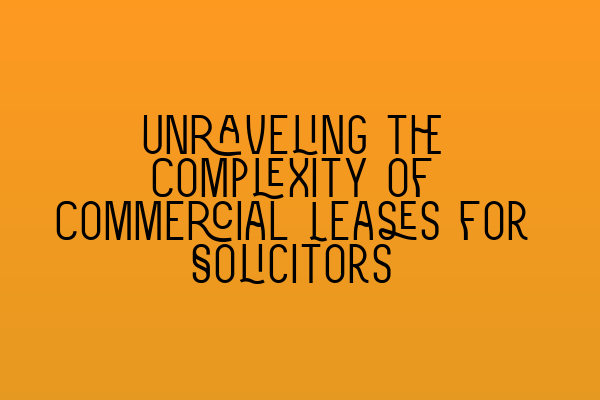Unraveling the Complexity of Commercial Leases for Solicitors
Commercial leases can be a complex and intricate area of property law, requiring solicitors to possess a deep understanding of the intricacies involved. As a solicitor, it is crucial to be well-versed in the legalities surrounding commercial leases to adequately assist clients in navigating through this complex landscape.
In this blog post, we aim to unravel the complexity of commercial leases, providing solicitors with valuable insights and guidance on how to handle such intricate matters. We will delve into various aspects of commercial leases, including their fundamental elements, common clauses, and potential pitfalls.
Before we dive into the specifics, it is essential to highlight the importance of staying up-to-date with the latest developments in property law. The Solicitors Qualifying Examination (SQE) is a crucial milestone for aspiring solicitors, and preparing for the exam requires a comprehensive understanding of all relevant areas of law, including property law. To prepare for the SQE, consider taking advantage of SQE 1 and SQE 2 preparation courses available at SQE Property Law & Land Law.
Now, let’s delve into the complexities of commercial leases, starting with their fundamental elements.
Fundamental Elements of Commercial Leases
1. Rent and Term
The rent and term of a commercial lease are two fundamental elements that must be carefully negotiated and outlined in the lease agreement. It is essential to specify the duration of the lease, whether fixed-term or periodic, and clarify the expectations regarding rent payments.
2. Use and Purpose
Commercial leases often include clauses that outline the permitted use and purpose of the leased property. These clauses ensure that the tenant uses the property for its intended purpose and prevents any misuse that may be detrimental to the landlord or other tenants.
3. Repair and Maintenance
Provisions related to the repair and maintenance of the leased property are crucial to avoid potential disputes. It is essential for solicitors to carefully review and negotiate the repair obligations between the landlord and tenant, ensuring fairness and clarity for both parties.
4. Alienation and Assignment
The ability to assign or sublet a commercial lease is an important aspect that solicitors must address. Inserting clauses regarding alienation and assignment enables the tenant to transfer their leasehold interests to another party, subject to certain conditions.
Common Clauses in Commercial Leases
1. Break Clauses
Break clauses enable either the landlord or tenant to terminate the lease early, typically providing specific conditions that must be met. As a solicitor, it is crucial to carefully consider the terms and conditions of break clauses to protect your client’s interests.
2. Rent Review Clauses
Rent review clauses establish a mechanism to periodically review and adjust the rent throughout the lease term. These clauses are often complex and require detailed analysis to ensure fairness for both parties involved.
3. Service Charge Clauses
Commercial leases frequently include service charge clauses to cover the expenses associated with maintaining and managing the property. As a solicitor, it is crucial to scrutinize these clauses to protect your client from any unexpected or excessive charges.
Potential Pitfalls in Commercial Leases
1. Failure to Seek Legal Advice
One of the biggest pitfalls for both landlords and tenants is failing to seek legal advice before entering into a commercial lease. As a solicitor, it is your duty to advise your clients on the potential risks and obligations associated with the lease and ensure they make informed decisions.
2. Inadequate Due Diligence
Insufficient due diligence can lead to serious ramifications for both landlords and tenants. Conducting thorough research, including title searches and surveys, is essential to uncover any potential issues that may impact the leasehold interests.
3. Ambiguous or Vague Language
Ambiguous or vague language within a commercial lease can give rise to misunderstandings and disputes between the parties involved. Solicitors must meticulously review and clarify all clauses to avoid any potential ambiguities that may lead to future conflicts.
In conclusion, commercial leases present numerous complexities that require solicitors to possess a comprehensive understanding of property law. By unraveling the intricacies of commercial leases and being well-prepared, solicitors can effectively guide their clients through this complex area of law.
Make sure to stay updated on the latest developments in property law by participating in SQE 1 practice exam questions, SQE 1 practice mocks (FLK1, FLK2), and SQE 2 preparation courses offered by SQE Property Law & Land Law. Stay informed about the upcoming SRA SQE exam dates as well.
Remember, as a solicitor, it is your responsibility to provide expert advice and representation to your clients. By mastering the complexities of commercial leases, you can help your clients navigate this area of law with confidence and ensure their best interests are protected.
Sources:
– SQE 1 Practice Exam Questions: https://fqps.co.uk/sqe/sqe1-preparation/mcq-practice-quiz
– SQE 1 Practice Mocks FLK1 FLK2: https://fqps.co.uk/sqe/sqe1-preparation/practice-mocks-quiz
– SQE 2 Preparation Courses: https://fqps.co.uk/sqe/sqe2-preparation
– SQE 1 Preparation Courses: https://fqps.co.uk/sqe/sqe1-preparation
– SRA SQE Exam Dates: https://fqps.co.uk/sqe/sqe1-sqe2-exam-dates
